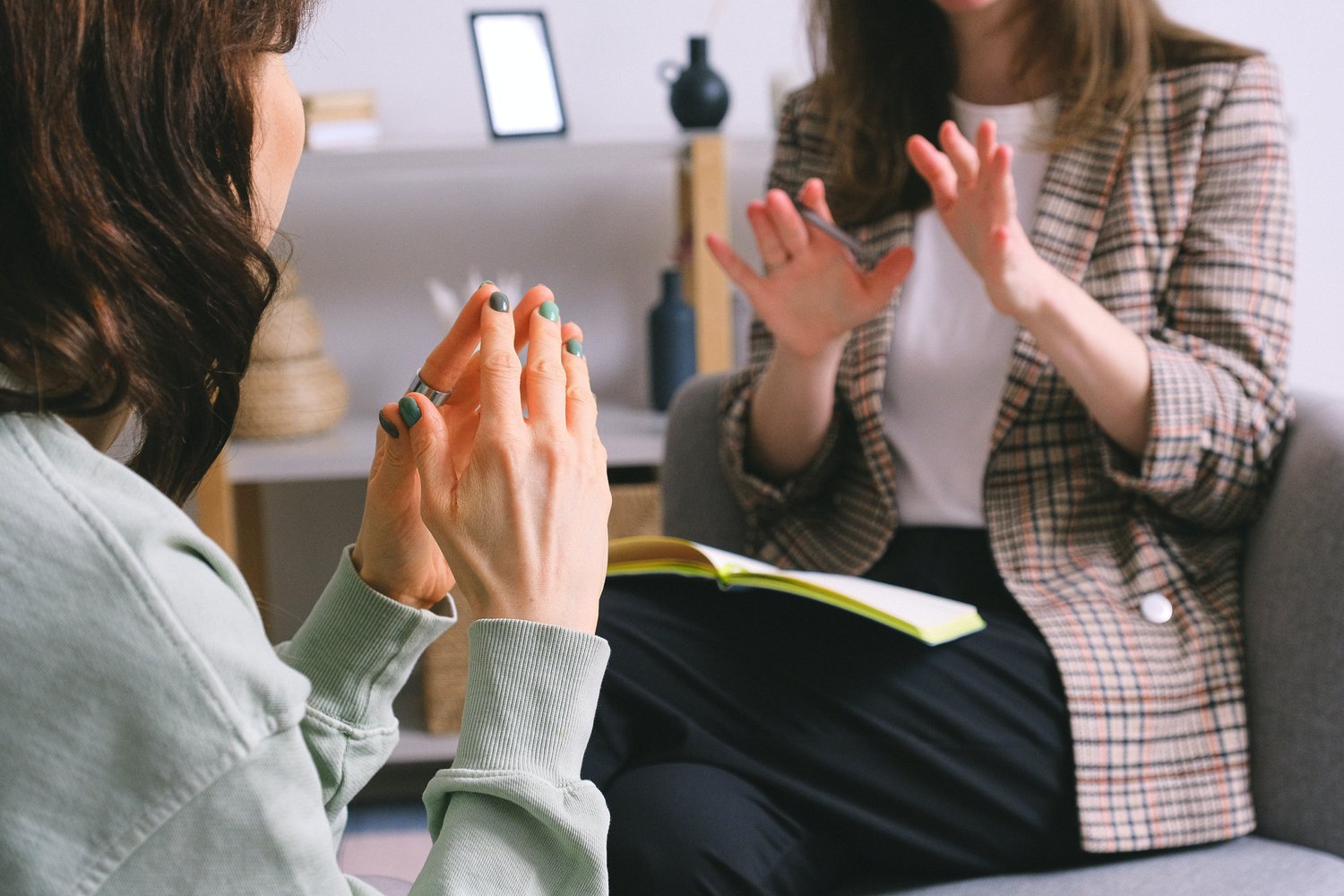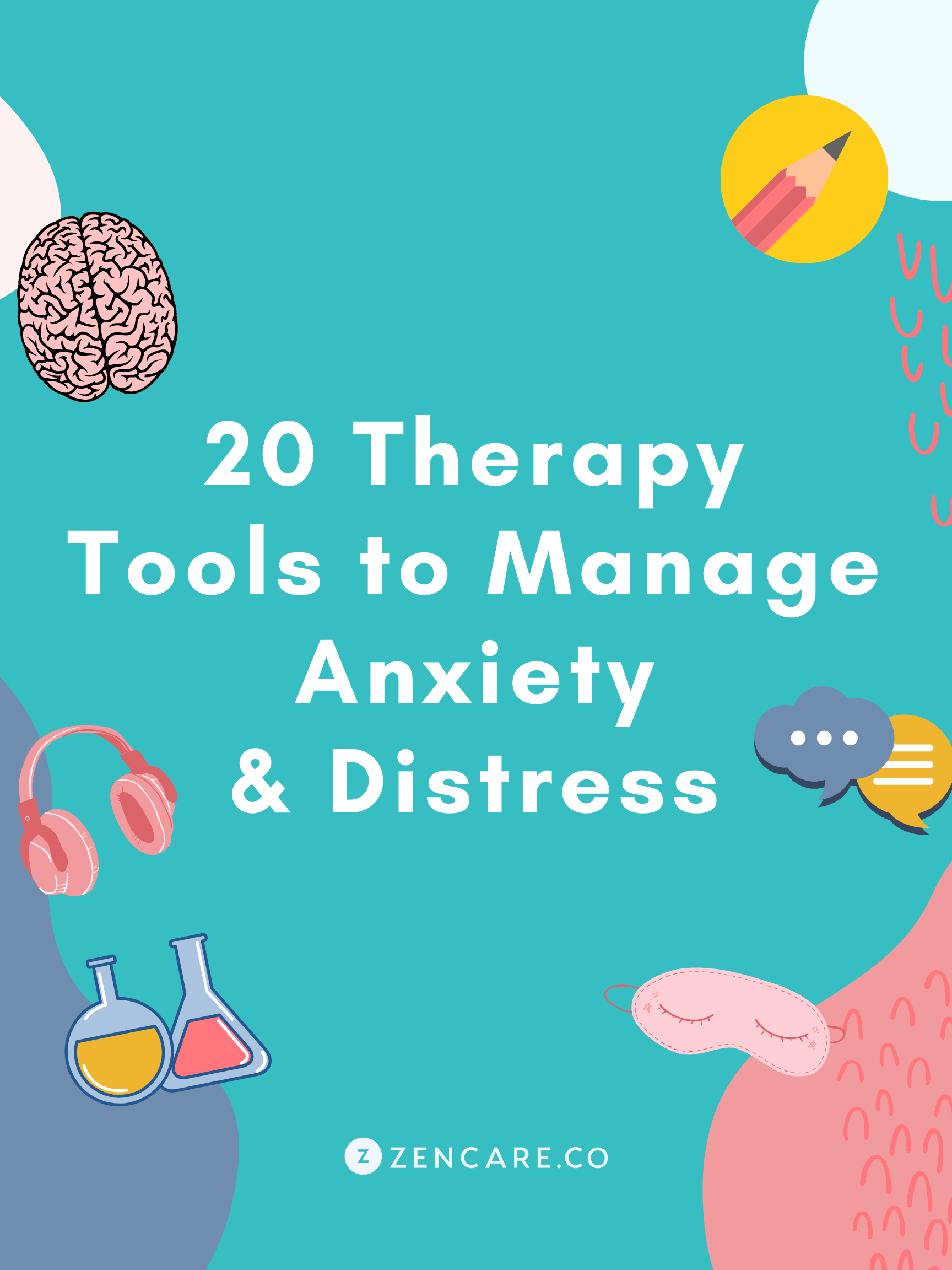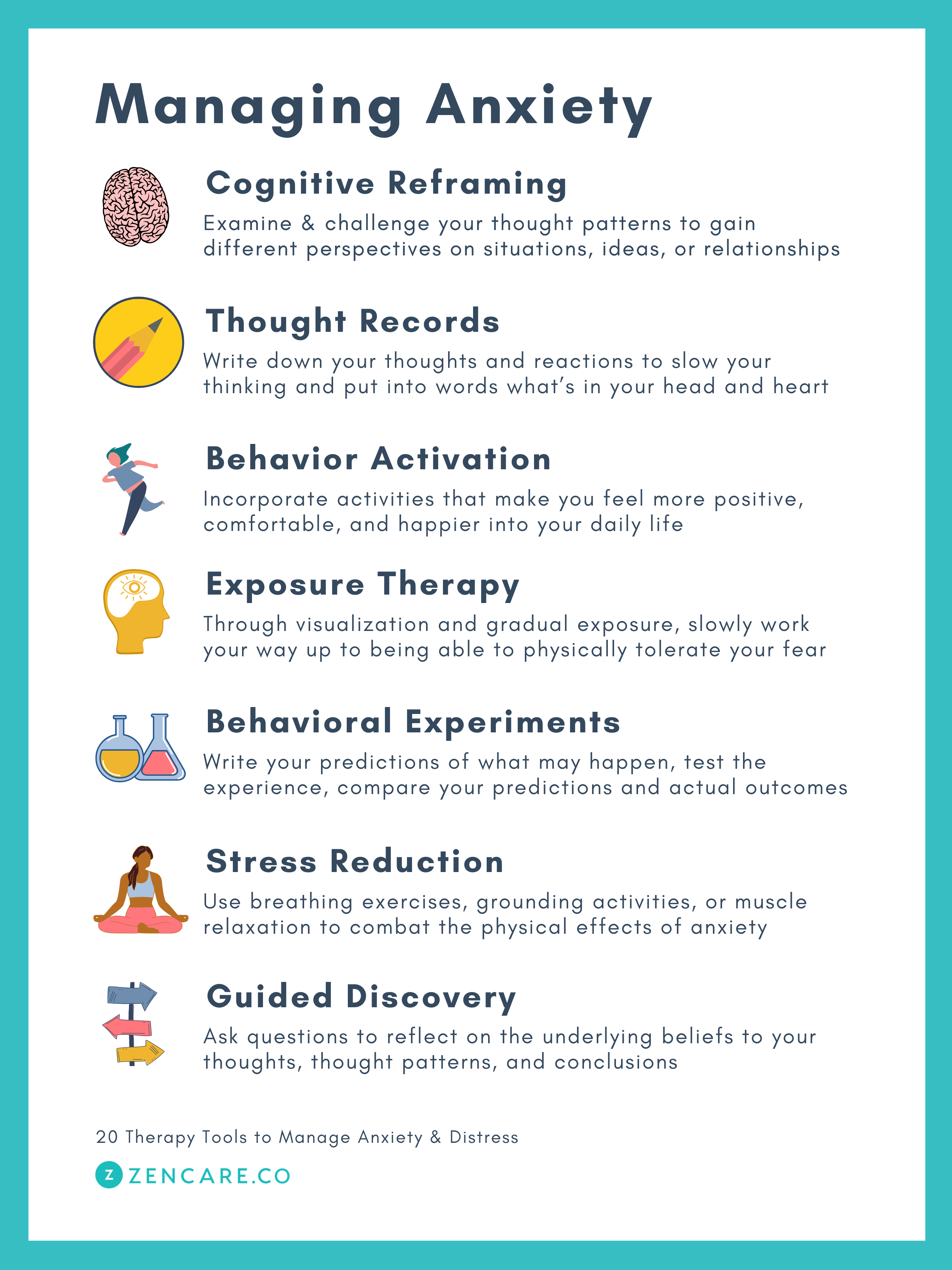Counselling for anxiety disorder available online and face-to-face near you
Counselling for anxiety disorder available online and face-to-face near you
Blog Article
Discovering Different Methods in Therapy for Anxiousness Disorder for Long Lasting Modification
When dealing with stress and anxiety problems, it's necessary to discover a selection of therapy methods. Each approach supplies one-of-a-kind understandings and devices to aid you manage your symptoms efficiently. You may find that incorporating strategies can generate the very best outcomes. Comprehending the nuances of these techniques is key to fostering lasting change. What happens if the ideal combination could release a brand-new degree of emotional health for you?
Comprehending Stress And Anxiety Conditions: A Brief Review
Anxiety problems, which influence numerous people worldwide, can considerably affect every day life. You might experience frustrating sensations of concern or worry that appear unmanageable. These feelings can result in physical symptoms like an auto racing heart, sweating, or even dizziness. Common kinds of stress and anxiety disorders consist of generalised stress and anxiety disorder, panic condition, and social anxiety problem. Each has distinct signs, yet they all share a tendency to interrupt your routine and relationships.Understanding the source of your anxiety is crucial. It might originate from genetics, mind chemistry, or life experiences. Recognizing your triggers can aid you manage your feedbacks better. It is very important to keep in mind that you're not the only one in this struggle. Many individuals face similar obstacles, and seeking help is a strong action towards feeling much better. By learning about stress and anxiety problems, you're currently on the course to understanding and handling your condition much more effectively.
Cognitive-Behavioral Treatment: Challenging Unfavorable Idea Patterns
In Cognitive-Behavioral Treatment, you'll start by recognizing the unfavorable idea causes that contribute to your anxiety. As soon as you recognize these thoughts, you'll deal with changing them with more favorable choices. Together, you'll develop effective coping methods to aid handle your stress and anxiety in day-to-day situations.
Identifying Negative Thought Triggers

When you run into minutes of distress, recognizing the details triggers behind your negative thoughts can be vital in handling stress and anxiety. Begin by taking note of situations that prompt sensations of worry or anxiety. Is it a jampacked room, a forthcoming target date, or a conversation with certain individuals? Write down these instances in a journal. This will certainly aid you recognize patterns in your thinking. Notice physical experiences that accompany your unfavorable thoughts, like a racing heart or rigidity in your breast. By pinpointing these triggers, you obtain understanding into what's fueling your anxiety. Recognizing these connections is the primary step in testing those thoughts and ultimately reclaiming control over your psychological actions.
Replacing Ideas With Positives
Challenging unfavorable idea patterns is a necessary step in changing your state of mind and reducing stress and anxiety. You might frequently locate on your own trapped in cycles of self-doubt or devastating reasoning. Rather than allowing these ideas determine your feelings, practice replacing them with realistic alternatives or positive affirmations. When you assume, "I can't handle this," change it to, "I can handle difficulties one action at a time." This simple change can substantially influence your emotional state. Routinely determining and responding to these negative thoughts aids create a much healthier inner discussion. Remember, it requires time and effort, yet constantly exercising this technique can result in lasting adjustment, encouraging you to encounter stress and anxiety with renewed confidence and resilience.
Building Coping Strategies Together
Changing unfavorable thoughts is only the beginning of taking care of stress and anxiety successfully. To develop long-term adjustment, you need to construct coping methods that equip you. Cognitive-Behavioral Therapy (CBT) helps you identify and challenge those unhelpful idea patterns. With each other, you and your counselor can discover how these ideas effect your feelings and behaviors.Start by developing sensible strategies, like journaling or mindfulness workouts, that enable you to confront anxiousness head-on. When you face your fears progressively, you'll learn to respond differently.

Mindfulness and Acceptance-Based Approaches: Cultivating Present-Moment Understanding
As you navigate the intricacies of anxiety, including mindfulness and acceptance-based methods can substantially boost your capability to grow present-moment understanding. By focusing on the present moment, you'll locate that you can observe your thoughts and feelings without judgment (Counseling services for anxiety). This technique helps you recognize your stress and anxiety without really feeling bewildered by it.Engaging in mindfulness workouts, such as deep breathing, body scans, or guided meditations, permits you to ground on your own in your current experience. Acceptance-based techniques urge you to embrace your emotions instead of fight against them. They lose their power over you.Incorporating these methods right into your everyday regimen can change exactly how you react to anxiousness when you accept your sensations. You'll establish durability and learn to navigate difficult situations with greater simplicity. Eventually, growing present-moment recognition lays the foundation for long lasting modification, equipping you to lead a much more fulfilling life
Exposure Treatment: Challenging Anxieties Gradually
Exposure treatment helps you confront your fears in a gradual method, making it less frustrating. You'll learn techniques to face anxiety-provoking scenarios step by action, while also building coping techniques to handle your reactions. This method equips you to take control and decrease anxiety over time.
Gradual Exposure Methods

When dealing with anxiousness, gradually facing your worries can be a powerful means to gain back control. This technique, recognized as progressive direct exposure, includes gradually subjecting on your own to the circumstances or things that trigger your anxiety. Beginning with less daunting scenarios and slowly work your method approximately more tough ones. If you're scared of public talking, you might begin by talking in front of a mirror, after that proceed to sharing thoughts with a good friend, and eventually attend to a tiny group. Each step aids desensitize you to the worry, building your self-confidence over time. Remember, it's important to rate on your own and celebrate small success as you move via this procedure, reinforcing your capability to handle stress and anxiety effectively.
Building Coping Techniques
Structure reliable coping approaches is important for taking care of anxiety, particularly as you face your concerns progressively - Counseling services for anxiety. One effective approach is direct exposure therapy, where you start by facing your anxieties in a regulated fashion. Start with much less frightening circumstances and slowly work your way as much as more difficult scenarios. This steady direct exposure helps desensitize you to anxiety activates, making them less overwhelming.Incorporate leisure strategies, such as deep breathing or mindfulness, to calm your mind throughout direct exposure. Track your progression, celebrating little success along the method to increase your confidence. Remember, it's alright to take your time; the goal isn't perfection but constant renovation. By constructing these techniques, you'll equip yourself to navigate anxiousness and accept life a lot more totally
Psychodynamic Therapy: Discovering Source of Stress And Anxiety
Psychodynamic treatment checks out the unconscious mind, revealing the origin of your anxiety. By analyzing your ideas, feelings, and previous experiences, this technique assists you reveal underlying problems and unsettled issues that might contribute to your current anxiousness. You'll deal with a therapist to investigate childhood experiences, connections, and psychological patterns that shape your actions today.As you gain insight into these deeper layers of your subconscious, you'll start to acknowledge just how previous occasions influence your existing actions. This understanding can result in catharsis, allowing you to process emotions you could have suppressed.Through the restorative partnership, you can additionally determine defense reaction that might have developed over time, using a clearer course to transform. Eventually, psychodynamic therapy equips you with the devices to resolve your stress and anxiety at its core, advertising long lasting improvement in your emotional wellness.
Integrative and Holistic Strategies: Combining Methods for Greater Efficiency
Integrating different healing techniques can improve your journey towards taking care of anxiety better. By combining aspects from cognitive-behavioral treatment, mindfulness techniques, and holistic methods, you can produce a customized method that addresses your distinct needs. As an example, you might utilize cognitive-behavioral strategies to challenge negative idea patterns while integrating mindfulness exercises to ground on your own in the existing moment.Additionally, exploring all natural practices such as yoga or meditation can promote relaxation and decrease stress and anxiety signs and symptoms. This mix enables you to create higher self-awareness and resilience.Experimenting with these diverse techniques can aid you discover what reverberates most with you. Bear in mind, it's concerning discovering a synergy that works, instead of sticking to a solitary strategy. This integrative method not only offers immediate alleviation yet likewise fosters long-term skills for handling anxiety, encouraging you to redeem control over your life.
The Function of Support Solutions: Building Resilience Via Link
While it might appear that taking care of anxiousness is a singular journey, having a solid support group can play a vital role in your strength. Bordering yourself with understanding good friends, household, or support system creates a secure space where you can honestly share your feelings and experiences. When you get in touch with others, you remind on your own that you're not the only one in this struggle.These connections offer motivation and can provide functional coping strategies that have actually benefited others. It's additionally a possibility to obtain viewpoint; close friends can assist you see scenarios differently, lowering feelings of isolation.Moreover, emotional assistance cultivates a sense of belonging, which can considerably reduce stress and anxiety symptoms. By leaning on your support group, you can construct resilience and deal with obstacles better. Bear in mind, connecting for assistance suggests toughness, and it can make all the difference in your trip toward handling anxiousness.
Frequently Asked Questions
What Are the Typical Signs And Symptoms of Stress And Anxiety Disorders?
You might experience restlessness, tiredness, difficulty concentrating, irritation, muscular tissue stress, and rest disruptions. Physical symptoms can include rapid heartbeat, sweating, and trembling. Acknowledging these indications early can assist you look for ideal assistance and therapy.
The Length Of Time Does Treatment Usually Last for Anxiety Conditions?
Therapy for anxiety disorders generally lasts anywhere from a couple of weeks to a number of months. It truly depends upon your private needs, progress, and the techniques your therapist utilizes to aid you handle your stress and anxiety effectively.
Can Medication Be Used Along With Treatment for Anxiousness?
Yes, medication can absolutely be utilized together with therapy for anxiety. Incorporating both techniques typically improves treatment performance, aiding you handle symptoms while exploring underlying issues via counseling (Counseling services for anxiety). Constantly consult your doctor for personalized advice
Exist Self-Help Approaches for Handling Anxiety?
Yes, there are numerous self-help techniques for taking care of anxiousness. You can practice mindfulness, take part in routine exercise, preserve a well balanced diet regimen, develop a routine, and use deep breathing techniques to help in reducing anxiety signs and symptoms successfully.
How Do I Know if I Required Specialist Assistance for Anxiousness?

Report this page